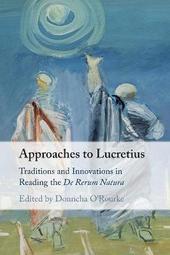
|
Approaches to Lucretius: Traditions and Innovations in Reading the De Rerum Natura
Paperback / softback
Main Details
| Title |
Approaches to Lucretius: Traditions and Innovations in Reading the De Rerum Natura
|
| Authors and Contributors |
Edited by Donncha O'Rourke
|
| Physical Properties |
| Format:Paperback / softback | | Pages:338 | | Dimensions(mm): Height 229,Width 152 |
|
| Category/Genre | Literary studies - classical, early and medieval
Western philosophy - Ancient to c 500 |
|---|
| ISBN/Barcode |
9781108433105
|
| Classifications | Dewey:187 |
|---|
| Audience | | Professional & Vocational | |
|---|
| Illustrations |
Worked examples or Exercises; 2 Halftones, black and white
|
|
Publishing Details |
| Publisher |
Cambridge University Press
|
| Imprint |
Cambridge University Press
|
| Publication Date |
8 July 2021 |
| Publication Country |
United Kingdom
|
Description
Both in antiquity and ever since the Renaissance Lucretius' De Rerum Natura has been admired - and condemned - for its startling poetry, its evangelical faith in materialist causation, and its seductive advocacy of the Epicurean good life. Approaches to Lucretius assembles an international team of classicists and philosophers to take stock of a range of critical approaches to which this influential poem has given rise and which in turn have shaped its interpretation, including textual criticism, the text's strategies for engaging the reader with its author and his message, the 'atomology' that posits a correlation of the letters of the poem with the atoms of the universe, the literary and philosophical intertexts that mediate the poem, and the political and ideological questions that it raises. Thirteen essays take up a variety of positions within these traditions of interpretation, innovating within them and advancing beyond them in new directions.
Author Biography
Donncha O'Rourke is Lecturer in Classics at the University of Edinburgh. He is author of Propertius and the Virgilian Sensibility (forthcoming) and co-editor of Didactic Poetry of Greece, Rome and Beyond: Knowledge, Power, Tradition (2019).
Reviews'This rich volume will help all students and readers of Lucretius's poem challenge their preconceptions about it. All in, this volume represents an exciting collection of views on Lucretius that will undoubtedly inspire further scholarship not simply by setting out practical approaches for others to draw on and build upon but by showing how risking the unusual in our literary and philosophical thought can yield rich harvests from the seemingly familiar.' Emma Woolerton, Bryn Mawr Classical Review
|